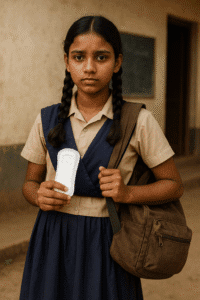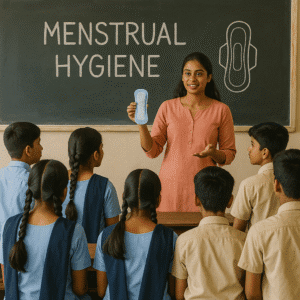Introduction: When a Period Becomes a Barrier

Each month, women and girls around the world menstruate. However, for millions, menstruation is a painful process made even worse by a lack of access to basic sanitary products. It goes beyond a mere lack of finances; it encompasses dignity, health, and basic human rights. Period poverty is a
global issue that affects the lives, education, health, and economic opportunities of women and girls, notably in less developed communities.
Menstruation remains shrouded in silence and stigma in many parts of the world. Young girls are actively taught to conceal their periods, often leading them to navigate this natural bodily function alone, in fear and shame. Period poverty, during which menstruation products aren’t easily accessible, combined with insufficient education on menstrual hygiene, creates a cycle of pain and suffering for women that lasts for generations.
Period Poverty Meaning: More Than Just a Lack of Pads
Period poverty is the inability to access, afford, or receive sanitary products, menstrual health education, clean water, or safe hygienic spaces to manage one’s period. It is a combination of poverty, gender bias, and a public health system collapse. It consists of:
● Not being able to access pads, tampons, or even menstrual cups.
● Lack of clean water and sanitation facilities for washing hands.
● Absence of menstrual hygiene education in schools and community centers.
● Cultural stigma and discrimination surrounding menstruation.
This form of poverty does not solely exist in developing nations; women and girls who find it hard to manage their periods with dignity also exist in
wealthy nations.
Root Causes of Period Poverty
1. Economic Barriers
The most noticeable barrier is economic. In many households, menstrual products are considered optional purchases. Women may need to buy food over sanitary products, which leads them to resort to unsafe makeshifts such as rags, newspapers, plastic bags, or even ash and leaves.
These makeshifts can result in serious health issues, such as:
● RTIs (Reproductive Tract Infections)
● UTIs (Urinary Tract Infections)
● Skin rashes and infections
● Infertility complications
2. Limited Availability of Menstrual Supplies
In remote or rural areas, even if someone has the money to buy sanitary products, they may not exist. This could be because of poor business infrastructure, insufficient stores, or social norms that prevent businesses from providing such products.
Menstrual products are also not available in stocked vending machines in schools, workplaces, and other public areas, which propagates the narrative that menstruation is an event that should be concealed and not spoken about in public.
3. Cultural Norms and Menstrual Stigmas
 In some cultures, this biological event is treated as something filthy or poisonous and therefore dirty. Women are usually:
In some cultures, this biological event is treated as something filthy or poisonous and therefore dirty. Women are usually:
● Avoided in areas such as kitchens or places of worship.
● Excluded from social and festive gatherings.
● Advised against speaking about menstruation publicly.
This external pressure and stigmatization create a gap in knowledge, causing immense confusion. There is a lack of education around periods, which leads to starting menstruation without understanding, resulting in feeling frightened, bewildered, and shamed.
Why Poor Menstrual Hygiene Hurts Health, Education, and Dignity
 1. The Potential Hazards to Physical Health
1. The Potential Hazards to Physical Health
Not cleaning adequately during the menstruation period can lead to illnesses such as:
● Using dirty pads for extended periods leads to RTIs and UTIs.
● Fungal infections and inflammation of the cervix.
● Wanting to maintain poor hygiene increases the chance of getting cervical cancer.
Even women with sanitary towels cannot maintain basic hygiene without clean toilets, water, and disposal facilities.
2. Educational Disruption
The inability to afford sanitary products leads to missing school for multiple days each month, which leads to:
● Struggling academically.
● Higher dropout rates, particularly after reaching puberty.
● Restricted access to jobs in the future.
Consistently missing school causes girls to lose self-esteem, skip important tests, and ultimately abandon their education.
3. Challenges in the Workplace
Women in the workplace who lack access to pads, clean toilets, or hygiene facilities often:
● Take work absences and leave early.
● Shun positions requiring long travels or overtime.
● Suffer from humiliation and reduced pay.
All of these negatively impact their productivity, career development,
and financial self-sufficiency.
4. Mental and Emotional Impact
The effects of menstruation management in shameful or unsafe conditions are damaging psychologically:
● Reduced self-worth.
● Fear of leaking and consequent public ridicule.
● Isolation leading to depression.
In particular, young girls endure emotional damage that lingers over their development and shapes their perception of womanhood.
Menstrual Hygiene Management (MHM): Its Definition
MHM or Menstrual Hygiene Management is not as simple as possessing a pad or a tampon. Rather, it covers:
● Easy access to hygienic, safe, and reasonably priced menstrual products.
● Toilets that ensure privacy, safety, cleanliness, and provide water and soap.
● Used menstruation products disposal pathways.
● Courses and basic education about menstruation, hygiene, and the menstrual cycle.
All these facilitate MHM, which is critical for well-being, respect, and empowerment. It also upholds gender equality by preventing menstruation from being an obstacle to education and work.
Efforts to End Period Poverty
1. NGOs and Grassroots Movements
Numerous organizations are actively trying to tackle period poverty:
● The Pad Project: Concentrates on sewing machine workshops for sanitary pads situated in rural regions.
● Goonj (India): Manufactures low-cost sanitary pads from recycled cloth.
● Days for Girls: Offers comprehensive menstrual health services along with education.
Apart from product distribution, these NGOs focus on awareness and community education.
2. Policies and Measures Adopted by Authorities
Some governments have taken action:
● Scotland was the pioneer in providing free menstrual products to all citizens.
● India started initiatives such as the Suvidha Sanitary Napkin Scheme for subsidizing sanitary napkins
● Certain US states have lifted taxes on menstrual products. As noted, more comprehensive and systematic policy efforts are still needed.
3. Menstrual Education
It’s essential to teach boys and girls in school the following through comprehensive menstrual education:
● The biological process of menstruation.
● Importance of hygiene.
● Respecting and supporting menstruators.
Empathy comes from knowledge. Understanding that menstruation is a natural biological process helps remove the shame surrounding it.
How You Can Help
Making a difference doesn’t require you to be an NGO or the government:
1. Contribute to initiatives focusing on menstrual health.
2. Collect and distribute sanitary products to schools or rural areas.
3. Initiate conversations in your community or on social media to break the silence.
4. Advocate for policies supporting free menstrual products and improved hygiene facilities.
5. Positively teach all children, both girls and boys, about menstruation early.
Conclusion: Bleeding with Dignity
Menstruation is both a biological process and a natural occurrence; it is neither a luxury nor a curse. Yet for countless individuals, it is a source of anguish, humiliation, and suffering. Women and girls are denied opportunities, good health, and dignity due to period poverty, which is
exacerbated by inadequate access to menstrual products, poor menstrual hygiene management, and stigma. Period care is something that should be treated as a human right. We need to normalize menstruation, achieve equity for all women, and make sure no one has to struggle in silence. When girls and women can manage.
Their periods with the dignity they deserve, we empower whole societies and communities.
Let’s menstruate free of shame.
Let’s end period poverty.

